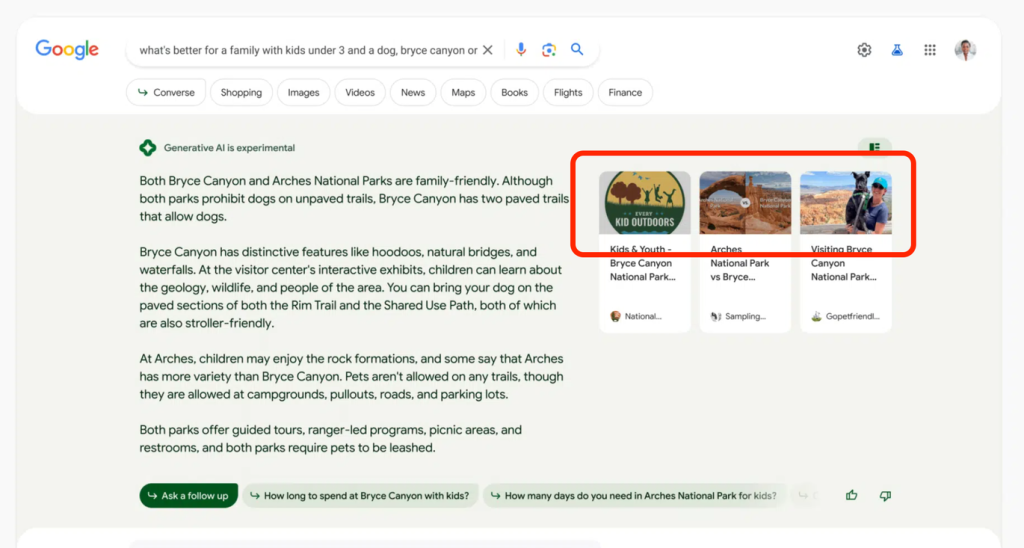Could Google’s new search feature affect how your business performs online?
In February 2024, Google released its newest search addition, otherwise known as the Search Generative Experience (SGE). This new feature is powered by generative AI and aims to generate the most helpful results for users.
While this sounds like a brilliant feature for internet users looking to get a quick answer to their search queries, could the introduction of AI search impact a website’s organic ranking?
Stick with us as we explore all the details about Google’s new SGE feature and learn how business owners need to adapt their SEO strategy to increase their chances of being showcased in an AI-generated result.
What is Google’s ‘Search Generative Experience’ (SGE)?
Google’s Search Generative Experience is set to transform the way we search online.
While a traditional search result showcases a list of relevant web pages based on their organic ranking for a keyword or topic, Google’s SGE uses AI to generate an immediate response for a search query based on information from a number of sources across the web.
This appears as an AI snapshot that sits at the top of the search results, which answers the question without the need to click on a result.
(Image Source: Search Engine Land)
As you can see here, the AI-generated result answers the search query in detail, provides links to featured images, and provides direct click paths to follow-up queries.
Google’s SGE may speed up the search process for online consumers, but for businesses fighting tooth and nail to rank as highly as possible, could all their SEO efforts now be for nothing?
According to experts from Semrush, a whopping 77.8% of searches now generate an AI-powered search result as well as the traditional set of web pages we know and love.
Let’s look a little deeper into how this could affect your business’s visibility online.
Could Google’s AI Search Affect Your Business’s Search Visibility?
Organic ranking methods fly out of the door when it comes to Google’s SGE feature. According to a recent study by Moz, the content, images and links generated by an AI search result are pulled from less than 50% of the top ten-ranking web pages for the keyword or topic.

(Image Source: Moz)
SGE content also changes the physical visibility of a search result. With the AI-generated search result taking up more than half of the page, the highest-ranking organic search result is shifted down the page by 1,500 pixels. While this doesn’t sound like much, those on a mobile or tablet device may miss the organic search results altogether when generating answers using Google’s SGE.
With this in mind, here are three ways Google’s SGE may affect your SEO strategy as an online business:
- Difficulty ranking for question-based keywords: Google’s AI-generated search mainly focuses on answering question-based keyword queries. Therefore, if you’re trying to rank for ‘how’ and ‘why’ type phrases, it’s likely that AI results will override your SEO efforts.
- E-E-A-T content will be even more important: If you want to appear as a source in an AI-generated source, your content must be informative, user-friendly and incredibly helpful. While it is not an official ranking factor, those who prioritise expertise, experience, authority and trustworthiness within their content will see more success with SGE.
- Meta text and images will be the ticket to visibility: While organic ranking is still extremely important in increasing your chances of being visible in a search result, meta text and images will become new focus points for business owners. AI search results often feature linked website cards, in which only the meta title and leading image are visible. If these are well-optimised on your page, you have a better shot at being featured in an SGE result.
Websites practising SGE-focused SEO techniques have actually seen a 219% increase in their web traffic since the release of Google’s AI search experience. So all hope should not be lost for your visibility online.
How to Update Your SEO For Google’s AI Search Experience
As Google’s search generative experience becomes a crucial factor to consider in your SEO strategy, it could be time to update your tactics.
Here are just a few changes you could make to your SEO strategy to remain more visible after Google’s SGE update.
Brainstorm Content Topics Using AI
If you want to learn more about what topics, phrases and keywords an AI bot is likely to pick up on when generating a search result, there is no better source to consult than AI itself.
Using an AI content bot like ChatGPT, you can craft meta titles, brainstorm topics and even find killer keywords that will improve your organic and SGE ranking.
Getting to grips with AI language from the beginning could influence your content strategy going forward.
Optimise Your Meta Images
Google’s generative search may produce its own written content, but it does pull images from relevant web pages.

(Image Source: Search Engine Land)
In order to increase your visibility, ensure that your meta images are enticing, high quality and relevant to the search topic.
Update Your On-page SEO
Optimising your on-page content is vital if you want your website to be sourced in an AI-generated search.
In order to appear as a credited card in a generative result, ensure that your on-page content demonstrates your expertise as a brand and answers all variations of a consumer question in a rich, in-depth format. This could be a buyer’s guide or a long-form review.
If you want to improve the efficiency of your on-page efforts, consulting an expert search engine optimisation agency could help you ensure that your content is visible in an SGE result.
With the ability to audit your live webpages for SEO errors and update your internal content with traffic-driving keywords and optimised meta-text, SEO agencies can give your site the push it needs to rank higher in organic and SGE searches.
Don’t Forget About Search Intent
Search intent is a crucial factor to consider when crafting an SEO strategy for AI-generated searching.
In order to compete with a SGE result, you need to know your audience inside and out. What keywords are they searching? What phrases would they use? The closer you can get to your consumer’s search intent, the more likely you’ll be to appear within an SGE result.
Start by monitoring your demographic, any new trends and how your competitors are responding to them. Using buyer-persona tools is also a great way to map your customer’s mindset. This could help with keyword and content crafting.
What’s Next For AI-Powered Searching?
There is no doubt that Google’s new SGE feature will have an impact on your business SEO strategy, but could this impact be positive?
AI-powered searches are less likely to take into account your ranking position, and more likely to prioritise your content quality. While an authoritative ranking position boosts your chances of being visible in an SGE search, those with a lower ranking now have the chance to climb to the top, simply by updating their approach to SEO.
The question is, where could AI-powered searching go next? Could we one day see a Google search result made up entirely of AI-generated results?



